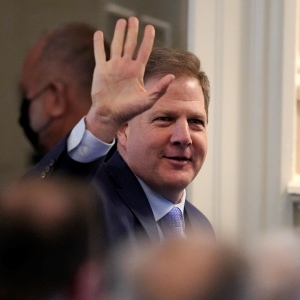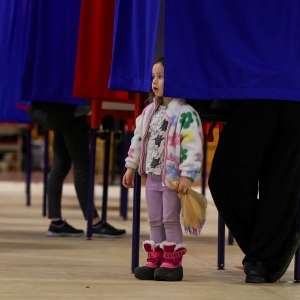New Hampshire’s largest city took center stage in the race for governor
| Published: 11-01-2024 3:27 PM |
Paula Whittaker’s feelings about Manchester depend on the specific section of the state’s largest city and the time of day. There are some areas, like the Western Side, that she avoids – especially when she has her daughter in tow – but she said she thinks the city’s struggles aren’t isolated to one spot.
“I’m not going to say that either side of the city is immune,” said Whittaker, who lives in Pembroke. Still, she said, there’s been a “really nice” revitalization of downtown.
People who live and work in Manchester have varying views on the Queen City. Some longtime residents and business owners say it feels safe and prosperous, others say it’s dangerous and run down.
This disconnect and opposing perceptions are now at the center of New Hampshire’s race for governor. Joyce Craig, the former mayor of Manchester, grounds her executive experience in her three terms running the city. She points to business and job growth, especially in the biotech sector, new housing projects and lower rates of violent crime in her hometown.
Former U.S. Senator Kelly Ayotte cites Manchester’s struggle with homelessness, crime and substance use as examples of Craig’s failed leadership.
One of Ayotte’s ads dubbed Manchester “Craigville,” and called her leadership a “dangerous disaster.”
Craig says the negative ads about Manchester are misleading and harm the city, while Ayotte maintains they’re a reflection of her opponent.
Judi Window, a self-proclaimed “staunch independent” voter and a “fifth-generation Manchester girl,” owns Diz’s Cafe on Elm Street downtown. She’s seen the city evolve over the years and said she doesn’t feel Ayotte’s negative portrayal of Manchester is accurate. Instead, she argues that the city’s struggles have been taken out of context.
Article continues after...
Yesterday's Most Read Articles
 Twelve acres near Concord Walmart cleared for future retail development
Twelve acres near Concord Walmart cleared for future retail development
 When N.H. lawmakers refuse to vote with their party, it comes with political consequences
When N.H. lawmakers refuse to vote with their party, it comes with political consequences
 ‘Financially vulnerable’: Years of missteps led up to Merrimack Valley overspending by $2 million last year
‘Financially vulnerable’: Years of missteps led up to Merrimack Valley overspending by $2 million last year
 ‘New Hampshire is just going to embarrass itself’: Former Child Advocate warns against proposed office cuts
‘New Hampshire is just going to embarrass itself’: Former Child Advocate warns against proposed office cuts
 Skeletal remains near I-393 identified as Concord man, 36
Skeletal remains near I-393 identified as Concord man, 36
 25-year-old Concord man identified as Steeplegate Mall RV fire victim
25-year-old Concord man identified as Steeplegate Mall RV fire victim
“Shedding a negative light on an entire city only hurts,” Window said. “There’s no reason to cut somebody down or cut a city down or cut anything down to make your point.”
Manchester has well-documented challenges with homelessness and drug use, especially during the pandemic. As of late last year, an estimated 538 people were experiencing homelessness in Manchester. Opioid overdose rates in the city are resuming a downward trend after a rise in 2020, presumably from the pandemic.
Eric Anderson, a 53-year-old Concord resident, has experienced homelessness and at one point went to a shelter in downtown Manchester. He said he remembers hearing gunshots and witnessing drug use around the shelter.
“I guess they’re cleaning it up, but it was pretty much a warzone down there,” Anderson said.
Some people argue these issues aren’t exclusive to Manchester – the housing and opioid crises are statewide, even nationwide problems. That’s part of what Window found especially disheartening in the ads.
“All of the issues that they’re pointing to about Manchester are worldwide,” Window said. “They are not a Manchester issue.”
Richard Tango-Lowy, the owner and master chocolatier at Dancing Lion Chocolate on Elm Street, agreed – Manchester feels safe, he said, especially compared to other, bigger cities.
“Whenever anybody talks about ‘not safe in Manchester,’ it’s kind of hard not to snicker a little bit,” Tango-Lowy said. “From any sort of scale perspective, to me, this is such a small, not dangerous city in any real respects, anywhere.”
Tango-Lowy said he hasn’t seen the television ads – he’s too busy making chocolate, he said – and declined to share who he’ll be voting for.
He’s run his business in Manchester since 2007, lives downtown and walks to work. He said he’s seen homelessness improve, especially since a few years ago when there were “people everywhere on the streets.”
“I’ve watched it get better over the years, despite what people say,” Tango-Lowy said, emphasizing that homelessness is a “bigger problem than us, than the city or even the state.”
Patrick Mills, who owns the Bonfire Restaurant & Country Bar downtown, still sees it as a problem. He’s thrown his support behind Ayotte – a former state Attorney General – mainly for her role in putting away Michael Addison, who was convicted of killing a Manchester police officer. Mills himself starred in an ad for Ayotte, in which he details what he feels was a lack of action by Craig to deal with homelessness in the city.
“Joyce Craig let the homeless take over Manchester,” Mills says in the ad. “Downtown was a total nightmare. There were needles, drugs, feces all over the place. Joyce put the needs and the cares of the homeless before us.”
Despite receiving some backlash – like negative reviews on his bar and, as he calls it, the “spotlight I never wanted” – he stands by his endorsement of Ayotte. He also believes the ads are accurate.
“For someone who sees it and witnesses it every day, I believe it’s 100% factual,” Mills said. The homelessness, in his view, prevents people from coming to the city.
Manchester’s prevalence in political ads has risen to the point that both candidates were asked about it in the first question of a debate at Saint Anselm College last week. The moderator described the city as being “caught in the crossfire” of the campaigns. When asked about her views on the city and the potential impacts of negative ads, Ayotte said she’ll look to partner with the new Republican mayor, Jay Ruais, on issues like homelessness and substance use disorders.
“Manchester is a really important city,” Ayotte said. “What’s good for Manchester is good for New Hampshire.”
Craig, a fourth-generation Manchester resident, defended her tenure as mayor.
“I did everything I could,” she said. She jabbed at Ayotte for her negative ads about the city.
“She has spent this entire campaign depicting Manchester as a terrible place, and that is completely unacceptable,” Craig said. “It’s hurting our community, it’s hurting our businesses, and it’s showcasing Manchester in the wrong light.”
Ayotte maintains the ads point out what she said she hears from residents, that they’re struggling from the effects of homelessness and substance abuse in the city.
“Our ads show what happened under the leadership, or the lack of leadership, of Joyce Craig,” Ayotte said. “We can’t have that lack of leadership in Concord.”
Charlotte Matherly is the statehouse reporter for the Concord Monitor and Monadnock Ledger-Transcript in partnership with Report for America. Follow her on X at @charmatherly, or send her an email at cmatherly@cmonitor.com.

























 ‘A wild accusation’: House votes to nix Child Advocate after Rep. suggests legislative interference
‘A wild accusation’: House votes to nix Child Advocate after Rep. suggests legislative interference  Sununu decides he won’t run for Senate despite praise from Trump
Sununu decides he won’t run for Senate despite praise from Trump Town elections offer preview of citizenship voting rules being considered nationwide
Town elections offer preview of citizenship voting rules being considered nationwide Medical aid in dying, education funding, transgender issues: What to look for in the State House this week
Medical aid in dying, education funding, transgender issues: What to look for in the State House this week
